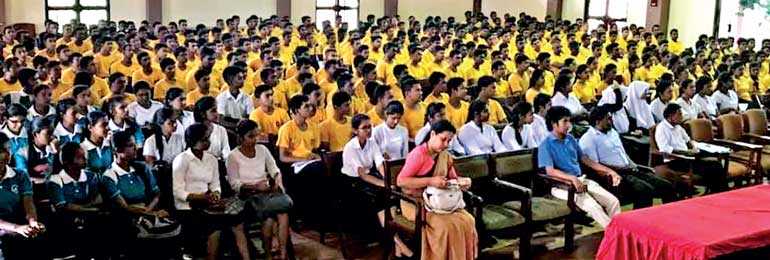Friday Feb 20, 2026
Friday Feb 20, 2026
Thursday, 28 November 2019 02:53 - - {{hitsCtrl.values.hits}}

The ICT industry of Sri Lanka is going through a severe structural, demographical and technological shifts, leading to a huge transformation in the nature of work. New entrants to the ICT workforce should be skilful to face the challenge.
The ICT industry presently has an annual shortage of 12,000 skilled workers. However, the Tertiary and Vocational Education and Training (TVET) sector finds it difficult to employ the students coming out from the system due to the mismatch of the supply with the demand of the industry.
The ICT Industry Skills Council (ICTISC) has been mandated to support the TVET sector to bridge the required skills gaps and creating links with the ICT industry to grab employment opportunities for TVET students. 
ICTISC has identified several key challenges for improving the required skills of the students coming out from the TVET sector such as Expanding TVET sector collaboration with the IT industry, bridging the instructor knowledge gaps, improving the required infrastructure, and enhancing the soft skills of students.
In order to overcome the challenges, ICTISC is now driving unique initiatives to convert its demographic potential into a dividend that will fuel the TVET Sector employment. ICTISC is closely working with the industry partners for an industry demand-driven curriculum through blended learning models using eLearning contents, distance learning models, etc., organising a series of soft skills training sessions to upgrade the skills required by the industry, organising career fairs to create a link with the IT industry, technical training programs for teachers and students to upgrade their technical knowledge, ICT Industry awareness sessions to create an awareness on ICT career opportunities, and industry exposure visits to create synergy, etc. for the TVET sector.
In addition to that a national campaign to change the perceptions over NVQ qualifications has been proposed by the ICTISC. Having a one authoritative responsible body for managing and guiding the TVET education sector under the subject ministry is timely to create a one voice in the TVET sector.
Speaking about the new initiatives of the ICTISC, ICTISC Chairman Chinthaka Wijewickrema stated: “ICTISC has created several platforms to boost ICT skills at the vocational and higher education level by integrating industry demand with academic learning. The enthusiasm and curiosity among the students was palpable since the much-awaited decision to introduce skill-based education in vocational and higher education would improve the employability quotient of Sri Lanka’s youth and show them various flexible paths to learn, earn and grow.”
Talking about the private and public collaborations, Wijewickrema added: “Creating avenues for private sector engagement has been a crucial strategic pillar for vocational sector success where many jobs could be created as IT users. Skill development faces several forms of market failures, including information. A skilled person knows his or her skills, but a potential employer does not; if employers had all the information, their willingness to pay for a skilled person would rise. ICT industry orientation program and career fair are good interventions to address information asymmetry. Strategies for reskilling and increasing the skills of the current workforce, as well as formal recognition of informally acquired skills, will also have to be reinforced.”
Consisting of industry leaders and stakeholders, the ICT Skills Council is an ICT industry-driven organisation supported by the Government of Sri Lanka. The ICT Skills Council aims to prepare the Sri Lankan workforce for a digital Sri Lanka and make Sri Lanka an ICT skill hub for the global ICT industry.
ICTISC is aligned with the ICT industry vision of creating 350,000 skilled workforce, by 2025. Further, ICTISC functions as the platform between the IT industry and the vocational education sector of the country. See www.ictskillscouncil.com for more information.